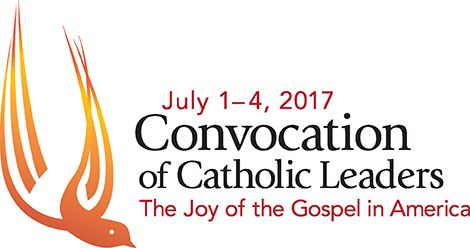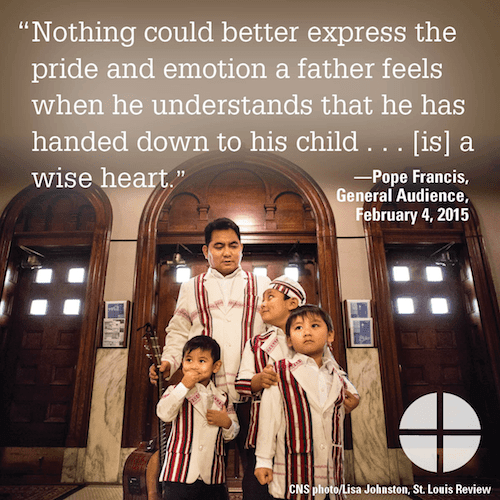The Making Disciples Today Blog has reflections to help you grow in your journey of missionary discipleship, reviews on recommended Catholic evangelization resources, and practical insight on how to evangelize in your daily life.
- Details
- Written by: Jennifer Durren

3 Takeaways from the Convocation of Catholic Leaders
3 members of the Burning Hearts Disciples team joined almost 3,500 participants at the USCCB's 2017 Convocation of Catholic Leaders. The goal of the gathering was to assemble Catholic leaders for a strategic conversation, under the leadership of the bishops, on forming missionary disciples to animate the Church and to engage the culture.
Called by the bishops, the historic convocation will find more than 3,000 Catholic leaders — bishops, clergy, religious and laypeople — meeting July 1-4 in Orlando, Florida, to focus on how the pope’s 2013 apostolic exhortation, “Evangelii Gaudium” (“The Joy of the Gospel”), applies in the United States.
Over the next few weeks we'll be sharing some of our personal insights from the Convocation, the impact this national strategic conversation will have on our apostolate's mission, and our hope for the long-term fruits that will result in the American Catholic Church.
UPDATE: Watch the videos of the Plenary Sessions at USCCB Video On Demand.
Takeaway #1: Unity As the Body of Christ
Immediately upon arriving at the Convocation, it was clear that the first day's theme of "unity" was going to be more than just a buzzword. 3,500 bishops, clergy, religious and laity, including five of the six residential cardinals in the country - featuring delegations from more than 80 percent of the dioceses in the county and all 50 states - were gathered with one unified purpose: to explore The Joy of the Gospel and how to live it out in the Church in the United States.
It was very profound and moving to be in one space with all those fellow Catholic Disciples listening to our Apostolic leaders, and having them listen to us. As we prayed and celebrated the opening Mass, I felt Jesus' love for us and our love for him and each other throughout the room. I found myself thinking,
This is what it means to BE the Body of Christ; although we don’t live it perfectly, we are all the same body of Christ.
- Details
- Written by: Burning Hearts Team

Next week, the U.S. Conference of Catholic Bishops are convening an unprecedented gathering of key leaders from dioceses and Catholic organizations from all across the country in order to assess the evangelization challenges and opportunities of our time, particularly in the context of the Church in the United States.
The goal of the gathering is to assemble Catholic leaders for a strategic conversation, under the leadership of the bishops, on forming missionary disciples to animate the Church and to engage the culture.
Called by the bishops, the historic convocation will find more than 3,000 Catholic leaders — bishops, clergy, religious and laypeople — meeting July 1-4 in Orlando, Florida, to focus on how the pope’s 2013 apostolic exhortation, “Evangelii Gaudium” (“The Joy of the Gospel”), applies in the United States.
Burning Hearts Disciples is honored to have accepted an invitation from the USCCB to participate in this conversation. We will be one of approx 160 collaborating organizations who see evangelization as integral to our mission. We will be among more than 3,000 Catholic leaders from other evangelizing organizations as well as delegations invited from each diocese.
- Details
- Written by: Dr. Gary Popcack

Pope Francis has called Jesus’ Beatitudes our “guide on the path of Christian life.” They reveal something about the ways God the Father relates to us, his children. Seen in this light, the Beatitudes present a unique opportunity for Christian men to become fathers after the Father’s own heart.
That’s why I wrote The BeDADitudes: 8 Ways to Be an Awesome Dad, which looks at how the Beatitudes can shed light on a uniquely Christian vision of masculinity, in general, and fatherhood, in particular. Here’s how the eight Beatitudes can help you be the father God is calling you to be.
- Details
- Written by: Fr. Larry Rice

As the weather turns warm with the coming of spring, many people are beginning to make plans for the coming gardening season. Most avid gardeners will tell you that they feel closer to God while working in their gardens than they do anywhere else. Planting, weeding, pruning, weeding, mulching, weeding, harvesting, and weeding are all opportunities to reconnect to God’s ongoing work of creation. Gardens are places to work the soil, but they can also be places to pray and seek a few moments of solitude.
From the earliest centuries of the Christian faith, people have seen in various plants echoes of religious and spiritual themes. Many of these are reflected in gardening folklore and even in the names of the flowers and herbs themselves: Mary’s Bedstraw, Ladder-to-Heaven, Penitent’s Rose, or Crown of Thorns. Like living stained glass, these flower and herbs became symbols of faith. And cultivating them became a means of prayer and contemplation. Today, many gardeners plant whole gardens dedicated to religious and biblical themes.
Among Catholics, “Mary’s Gardens” are popular and are filled with plants whose names and folklore mention the Virgin Mary. In Washington, DC, the Basilica of the National Shrine of the Immaculate Conception has a large Mary’s Garden, given to the Shrine by the National Council of Catholic Women. (Rev. Larry Rice, CSP*)
If you’d like to start a Mary’s Garden at your church or in your own yard, there are lots of resources available on the internet. You can find lists of plants, references for folklore, photos, design suggestions, and information on plants and their symbolism.
For example:

